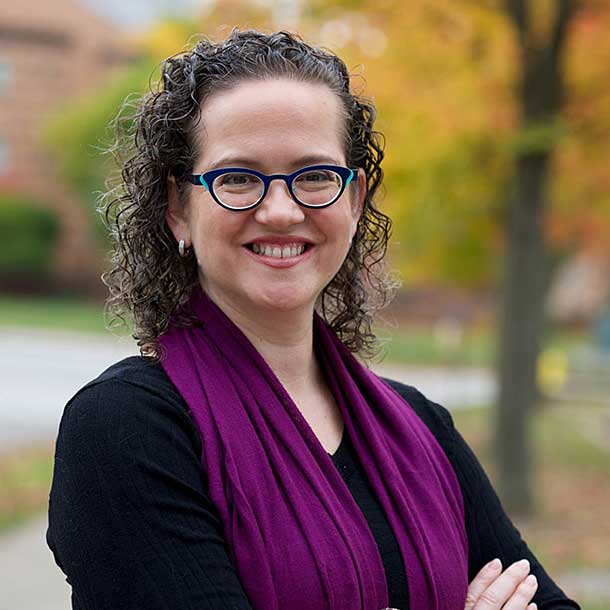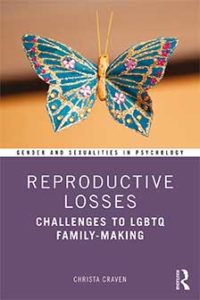
Craven receives 2021 CAR Book Prize for ‘Reproductive Losses: Challenges to LGBTQ Family-Making’

The 2021 Council on Anthropology and Reproduction (CAR) Book Prize has been awarded to Christa Craven the dean for faculty development and professor of women’s, gender, & sexuality studies and sociology and anthropology at The College of Wooster, for her book Reproductive Losses: Challenges to LGBTQ Family-Making, published in 2019. Craven and colleagues gathered virtually at the American Anthropological Association annual meetings to celebrate and engage with the book in a roundtable session, including commentators from the field, Nessette Falu, Dána-Ain Davis, and Natali Valdez.
“I am so honored to receive the CAR Book Award and to be acknowledged not only for the importance of research on LGBTQ+ reproductive experiences and losses, but also for reframing ethnographic writing to lift up the voices of those who generously shared their stories with me,” said Craven. “After 20+ years of working with CAR and SMA, I cannot imagine a higher honor!”
Part of the Society for Medical Anthropology, the CAR awards committee praised Craven’s work for its art in addressing an often-avoided issue, as a resource for a broad audience on reproductive justice, and its achievement in ethnographic writing by amplifying the voices of LGBTQ families who’ve experienced reproductive loss. The committee said, “Craven beautifully demonstrates the power of intentionality in research while simultaneously educating a broad audience on reproductive justice.” Dána-Ain Davis, who nominated the book, wrote, “The book attends to the severely under-researched experiences of non-biological parents, the often silent/silenced financial concerns about loss following assisted reproduction and adoption expenses, and the fears of further marginalization as non-normative parents’ LGBTQ families share, that are particular, if not unique to queer experiences of reproductive loss.” The committee also praised the book’s potential to “reframe ethnographic writing” to decenter “the ethnographer’s power in representation, and … focus on lives, loves and experiences” through a stylistic format that separates narratives from theoretical analysis.
Reproductive Losses and its companion website act as a resource for LGBTQ+ parents and families who have experienced failed adoption, infertility, and/or sterility, and those who support them—family & friends, medical & adoption professionals, therapists & counsellors—as well as a tool for scholars and professionals interested in LGBTQ health and family. The work includes detailed stories drawn from over fifty interviews with LGBTQ people (including those who carried pregnancies, non-gestational and adoptive parents, and families from a broad range of racial/ethnic, socio-economic, and religious backgrounds) to consider how they experience loss, grief, and mourning. Wooster students worked closely with Craven and contributed to the project by transcribing interviews, copy-editing, and assisting with the companion website through the support of Wooster’s Sophomore Research Program and the Henry Luce Fund. These students, now alumni, include Edie Anderson, Daniela Paz Bartlett Asenjo, Abigail Boll, Christina Bowerman, Chelsea Campton, Jacob Danko, Annie Jaeb, Hannah Lane-Davies, Ella Lang, Hailey Malzeke, Regina McCullough, Angela Neely, Emily Perbix, Evangeline Smith, Tiffany Trunk, Sara Tebeau, and Alissa Weinman.
“I really enjoyed working with Dr. Craven. I learned how long the process of researching and publishing a book takes and how this work can be made to serve those who were interviewed,” said Ella Lang ’21, who helped copy-edit the book and upload, categorize, and display the images and stories of people Craven interviewed on the companion website. “Dr. Craven’s work exemplifies the ways that academic work can be collaborative and accessible to non-academic audiences.”
Nov. 17, 2021
Posted in Faculty, News on November 18, 2021.
Related Posts
Related Areas of Study
Women's, Gender, & Sexuality Studies
Champion the experiences of women as they intersect with race, nation, ability, class, religion, and other axes of difference
Major MinorSociology
The study of social life, social change, and the social causes and consequences of human behavior.
Major MinorAnthropology
Use problem-solving and research skills to explore and understand communities and cultures in every part of the world.
Major Minor

